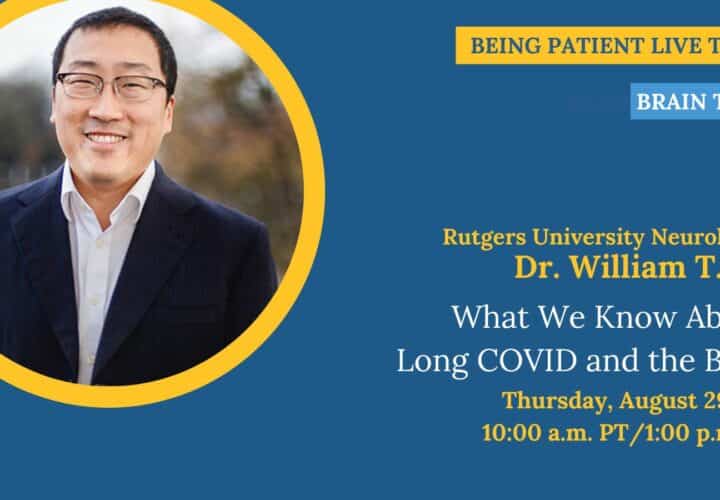Did a COVID-19 infection increase your chances of developing Alzheimer’s disease? A new study of blood biomarkers says yes, but Alzheimer’s blood test experts are skeptical — here’s why.
When the COVID-19 pandemic hit in 2019, researchers raised concerns it would increase the risk of neurodegenerative diseases like Alzheimer’s and Parkinson’s.
A recent Nature Medicine study supports these concerns, suggesting that older adults who caught COVID-19 did show changes in some — but not all — Alzheimer’s blood biomarkers.
“We’ve found biomarker evidence COVID could accelerate brain processes sometimes associated with Alzheimer’s disease,” Eugene Duff, a research fellow at Imperial College London who led the study, told Being Patient. “The effects appeared to be greater in those with other risk factors for dementia and in those who experienced severe COVID.”
On the one hand, this feels like the next step beyond existing research that has found that 400 million people who caught COVID-19 developed long COVID which, often enough, includes memory problems and cognitive impairment. Previous studies have found that older adults, especially those who had a severe bout of COVID-19, showed an increased risk of developing dementia in the years following infection. These results supported the longstanding idea that viruses and infectious diseases could spark Alzheimer’s disease.
On the other hand, however, experts who weren’t involved in the study were unconvinced by the data. One key biomarker the researchers measured didn’t align with the author’s conclusions. And the blood test used in the study isn’t very good at predicting who has Alzheimer’s pathology in the brain.
How does COVID-19 affect Alzheimer’s biomarkers?
Duff and colleagues analyzed brain scans and blood samples from 1,252 cognitively healthy individuals between the ages of 46 and 80 before and during the pandemic. The participants were part of the UK Biobank, a well-characterized database that helps researchers understand the risk factors for different diseases.
To determine the effects of COVID-19, the researchers matched infected individuals to uninfected controls with similar age, sex, and ethnicity.
After a COVID-19 infection, people were more likely to have a lower Aβ42/40 ratio. A lower ratio of these proteins in the blood shows that people may have beta-amyloid plaques, characteristic of Alzheimer’s disease, in the brain. However, the levels of another important blood biomarker, pTau-181, also decreased in the blood after an infection. People with low levels of this biomarker tend not to have beta-amyloid plaques in their brains.
People hospitalized with COVID-19 or who had high blood pressure had low levels of Aβ42/40 and higher levels of pTau-181 in their blood, both indicative of Alzheimer’s pathology.
But Alzheimer’s blood tests don’t predict which healthy people will develop the disease. They’re only designed to help doctors determine whether someone with cognitive problems might have Alzheimer’s. So, it isn’t clear what changes to these biomarkers mean for healthy people.
“These biomarkers are relatively new,” Duff said. “It is difficult to know how clinically meaningful the biomarker changes are.” It is difficult to determine cause and effect from observational studies, he added.
Why Alzheimer’s experts are skeptical
Michelle M. Mielke, a professor at Wake Forest University, wrote to Being Patient that the study’s findings don’t add up.
“For example, both the Aβ42/40 ratio and pTau-181 decrease between baseline pre-pandemic and follow-up assessments during the pandemic for all participants,” she wrote. These results disagree with each other: When it comes to Alzheimer’s risk lower levels of Aβ42/40 are associated with higher risk, but lower levels of pTau-181 are not. For detecting Alzheimer’s pathology, this biomarker “is better than Aβ42/40,” Mielke said. Meanwhile, the more sensitive blood biomarker suggests no increase in risk.
Mielke and Joseph Therriault, MD, and PhD candidate at McGill University, added that the blood test used in the study, designed by Quanterix, isn’t very accurate.
Against standard methods for confirming Alzheimer’s pathology like a brain autopsy or lumbar puncture, the Quanterix test was 60 to 69 percent accurate — slightly better than a coin toss. In head-to-head studies, it performs worse than other Aβ42/40 tests.
“The authors used the low quality blood tests for Alzheimer’s disease, so it’s very difficult to interpret the meaning of their results,” said Joseph Therriault, MD, and PhD candidate at McGill University, in an email to Being Patient.
When asked about the reliability, Duff said the Quanterix test is “well validated” and that “many studies report its successful use.”
He pointed to a study comparing the blood test to an amyloid PET scan. The Quantrix test was accurate 79 percent of the time. However, in cognitively healthy individuals, about two in three positive test results were false positives.
“In general, weaker performance does not imply bias,” Duff wrote, adding that although other Aβ42/40 tests performed better than this one, it doesn’t make the Quanterix results they obtained in this study unreliable.
While there are other lines of evidence suggesting that after a COVID-19 infection, the risk of developing dementia may increase, this study doesn’t make a compelling case.
“Overall, myself and many biomarker researchers in the field are not convinced SARS-CoV-2 infection increases risk of Alzheimer’s disease,” wrote Therriault. “The magnitude of the increased dementia risk associated with SARS-CoV-2 infection is also impossible to estimate from the data they presented.”
Though experts don’t find this particular study convincing, there are other lines of evidence linking viruses, including SARS-CoV-2, to brain damage and Alzheimer’s disease. Future studies that assess the impact of viral infection over a larger timescale and use newer, state-of-the-art biomarkers could provide us with more answers. However, Alzheimer’s takes many years to develop, and researchers still don’t understand its root cause — or causes. Viruses are under scrutiny for propelling it. And time will tell whether this study is backed up by future research.



